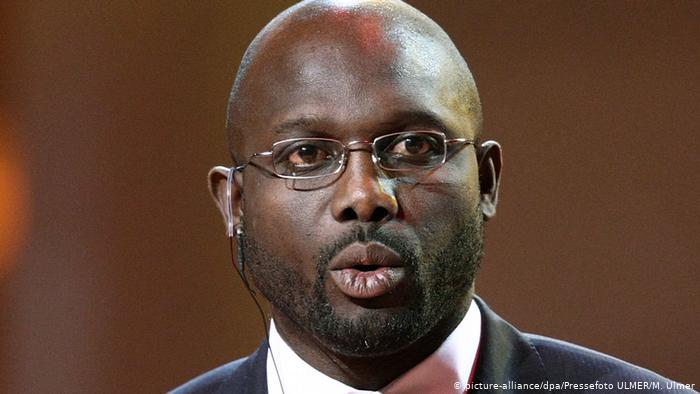Democracy triumphs in Liberia
Liberia cemented its position as Africa’s oldest independent democratic state when late Friday, President George Weah conceded defeat after provisional results from Tuesday, November 14, 2023, presidential run-off vote showed challenger Joseph Boakai beating him by just over a percentage point. With 99.58% of ballots counted, Boakai led with 50.89% to Weah’s 49.11%. The results […]

George Weah
Liberia cemented its position as Africa’s oldest independent democratic state when late Friday, President George Weah conceded defeat after provisional results from Tuesday, November 14, 2023, presidential run-off vote showed challenger Joseph Boakai beating him by just over a percentage point.
With 99.58% of ballots counted, Boakai led with 50.89% to Weah’s 49.11%. The results were a dramatic reversal of fortune from the 2017 election when Weah beat Boakai in the run-off, polling 61.5% of the votes while Boakai trailed with 38.5%.
In the first round of the presidential election held on October 10, 57-year-old Weah got 43.83% of the votes and Boakai 43.44% to move on to the runoff. The 78-year-old Boakai later won endorsements from the candidates who finished third, fourth and fifth strengthening his support base.
Weah was so affable in defeat, displaying an uncommon sportsmanship in the sub-region. He said in his concession speech: “I extend my heartfelt congratulations to president-elect Boakai, his supporters, and his campaign team. May his presidency be marked by success for all Liberians, and may our nation prosper under his leadership.
Election: Liberia security agents not partisan unlike in Nigeria – YIAGA Africa
Family of policeman killed in Boko Haram attack on Buni’s convoy gets N7.5m house
“The Liberian people have spoken, and their choice will be honoured and obeyed…The CDC has lost the election, but Liberia has won. This is a time for graciousness in defeat, a time to place our country above party, and patriotism above personal interest… Let us heal the divisions caused by the campaign and come together as one nation and one united people.”
Weah’s concession speech was a soothing balm on a divided nation, especially as it was delivered even before official results were announced. It was a bright light in the West African region with fears of declining democratic tenets where military coups have become a worrisome norm. And it brought fresh air of peace and stability to Liberia, solidifying its democratic credentials as West Africa’s foremost independent nation.
Truly, it was a high-stakes presidential and parliamentary elections, the first since the 2018 exit of the United Nations Mission in Liberia (UNMIL) that kept the peace for more than a decade in a country scarred by two devastating civil wars.
And the conduct and outcome saw regional and global leaders applauding. President Bola Tinubu commended President George Weah “for his sterling example, undiluted patriotism, and statesmanship. He has defied the stereotype that peaceful transitions of power are untenable in West Africa. He has demonstrated that the outcome of elections in the sub-region need not become the propellant of violence and unrest and that the will of the people must always be respected.”
The United States congratulated President-elect Boakai on his victory and President Weah for his acceptance of the results, saying, “We note the broad participation of Liberians across the country and applaud the commitment and dedication of Liberian citizens in exercising their right to vote and in engaging in the electoral process peacefully.”
The West African Elders Forum (WAEF) led by former President of Nigeria, Dr Goodluck Jonathan, commended Liberians for their patriotism and peaceful disposition during the general and run-off elections, further praising Liberia for consolidating democracy in the last two decades.
The European Union Election Observation Mission (EU EOM), African Union Election African (AUEOM) and the Economic Community of West African States (ECOWAS) Election Observation Mission to the Liberia Presidential and Parliamentary Elections also echoed the same sentiments.
We, at Daily Trust, while congratulating Liberians for successfully keeping the flag of democracy flying, urge them to heed and follow President Weah’s example by accepting the results and cooperating with the incoming government to deliver the dividends of democracy.
The president-elect must learn a lesson from the experience of the former award-winning international soccer star, who won the 2017 election with his promise to fight poverty, generate infrastructure development and bring justice to victims of conflict. But Weah was accused of not living up to key campaign promises, leading to his defeat.
Also, Boakai, who served as vice president under Ellen Johnson Sirleaf, Africa’s first democratically elected female leader, should live up to his campaign promise wherein he dubbed himself and his running mate “Rescue 1” and “Rescue 2” and lead in rescuing his country from its numerous challenges.
And his work is cut out for him. He should lead in tackling the ills ravaging his country, especially poverty. The United Nations Agency for Development (UNDP) says 52% of Liberia’s population lives in poverty and a further 23% are vulnerable to poverty. Meanwhile, more than 60% of Liberia’s 5.4 million population are below the age of 25 and unemployment is widespread among them, some of whom were former child soldiers in the civil war. And as the youth showed with their voting power, they are desperate for change. Their yearnings must be met.
Since there would be no distraction from election litigation, the president-elect should quickly use the post-election euphoria and initiate programmes that promote good governance, improve democratic practices, nation building and the rule of law. They should put in measures to ameliorate the infrastructure deficit.
Going forward, all Liberians must work together and no party, group, or individual should do anything to undermine the peace of the country.
